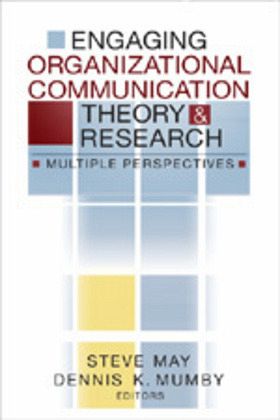Nicht lieferbar

Engaging Organizational Communication Theory and Research
Multiple Perspectives
Herausgegeben: May, Stephen; Mumby, Dennis K.
Versandkostenfrei!
Nicht lieferbar
This edited textbook introduces upper-level undergraduate students and entry-level graduate students to the major theoretical developments that have occurred within organizational communication during the past 20 years. The text presents theory emergence and development as an engaged process that occurs through the work of real scholars who are grappling with particular organizational problems and issues. Each chapter is written by a key academic who has been `engaged' with one of the featured theoretical perspectives. Each chapter highlights the history, assumptions, development, propositions...
This edited textbook introduces upper-level undergraduate students and entry-level graduate students to the major theoretical developments that have occurred within organizational communication during the past 20 years. The text presents theory emergence and development as an engaged process that occurs through the work of real scholars who are grappling with particular organizational problems and issues. Each chapter is written by a key academic who has been `engaged' with one of the featured theoretical perspectives. Each chapter highlights the history, assumptions, development, propositions, research and application of the theoretical perspectives that have influenced research, teaching, and practice in organizational communication-providing students with a thorough, and contemporary, view of the field.
Key Features :
- First book on organizational communication theories aimed solely at students (to date, all other works have been for colleagues/scholars)
The consistent chapter content allows instructors and students greater opportunity to compare and contrast theories, on comparable terms.
- Book chapters are written by authors most familiar with, and committed, to research, teaching, and service from their theoretical perspective. The authors selected are prominent in their area of research and are, ultimately, best suited to explain the theories included in the book. As a result, the authors provide both a more comprehensive and a more personal understanding of their theory that will invigorate and motivate students.
- The structure of the chapters provides students with a better understanding of the historical evolution of organizational communication as a field of study. This approach allows students to recognize how each theory developed within a specific cultural context, including unique political, economic, and social conditions.
- The book includes several emerging, yet significant, theoretical perspectives (feminist theory, postmodern theory, race theory, and globalization theory) that have increasingly influenced organizational communication. In other organizational communication books, these emerging theories have been either included as sub-sets of other theories or they have been covered with less attention or detail. The structured chapter format in this book provides them ample and comparable coverage to other important theories.
Key Features :
- First book on organizational communication theories aimed solely at students (to date, all other works have been for colleagues/scholars)
The consistent chapter content allows instructors and students greater opportunity to compare and contrast theories, on comparable terms.
- Book chapters are written by authors most familiar with, and committed, to research, teaching, and service from their theoretical perspective. The authors selected are prominent in their area of research and are, ultimately, best suited to explain the theories included in the book. As a result, the authors provide both a more comprehensive and a more personal understanding of their theory that will invigorate and motivate students.
- The structure of the chapters provides students with a better understanding of the historical evolution of organizational communication as a field of study. This approach allows students to recognize how each theory developed within a specific cultural context, including unique political, economic, and social conditions.
- The book includes several emerging, yet significant, theoretical perspectives (feminist theory, postmodern theory, race theory, and globalization theory) that have increasingly influenced organizational communication. In other organizational communication books, these emerging theories have been either included as sub-sets of other theories or they have been covered with less attention or detail. The structured chapter format in this book provides them ample and comparable coverage to other important theories.











